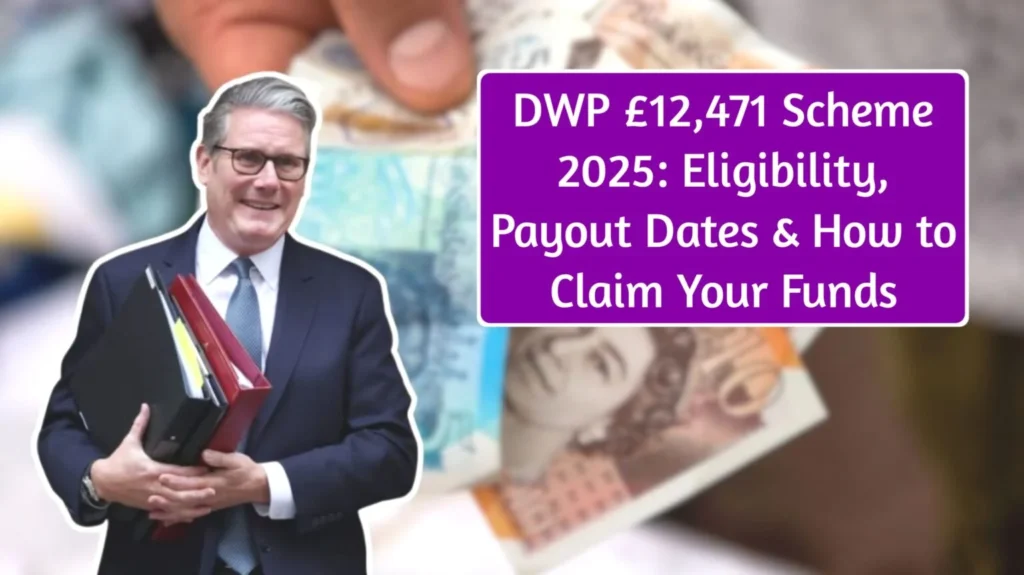The Department for Work and Pensions (DWP) in the United Kingdom continues to be a cornerstone in providing financial assistance to millions of citizens. In 2025, one programme that has gained significant attention is the DWP £12,471 Scheme, aimed at supporting pensioners and individuals with limited income. This initiative helps ensure that vulnerable groups are not left behind during times of rising living costs. Below is a detailed look into how the scheme works, who qualifies, and how to claim it.
What is the UK DWP £12,471 Pension Support Scheme 2025?
The DWP £12,471 Scheme 2025 is designed to guarantee that pensioners and qualifying individuals receive at least £12,471 annually. This figure is linked to income support through the State Pension, Pension Credit, and additional welfare benefits. The scheme acts as a safety net, ensuring that retired citizens can maintain a minimum standard of living despite financial pressures.
Why the Scheme Was Introduced
Rising costs for essentials such as housing, food, and energy have left fixed-income households struggling. Pensioners were disproportionately affected, which led to the launch of this scheme. By providing a minimum financial benchmark, the DWP ensures that eligible individuals receive steady income support to better manage inflation-driven expenses.
Who Can UK DWP £12,471 Pension Support Scheme 2025 Apply?
Eligibility mainly targets pensioners, carers, and low-income households. Applicants must:
-
Be over State Pension age.
-
Reside in the UK.
-
Earn less than the government’s set income threshold.
Those falling short of the minimum income requirement may receive top-up payments via Pension Credit. Some individuals with disabilities or caregiving responsibilities may also qualify.
How Payments Are Distributed
Payments are made weekly or monthly depending on benefit type. The goal is to ensure annual support amounts to £12,471. Pension Credit and State Pension recipients usually get funds transferred directly into bank accounts without needing extra paperwork, making the process smooth and reliable.
Payment Dates for 2025
Payment schedules typically follow the State Pension calendar, with disbursements every four weeks. In some cases, weekly payments may apply. Your National Insurance (NI) number determines the exact day of payment. Most pensioners will be notified directly by the DWP with their timetable.
Application Process
For those already on State Pension or Pension Credit, payments may be automatic. If not, you can claim through:
-
The official UK Government website.
-
A DWP telephone helpline.
-
A postal application using the DWP form.
Supporting documents may include proof of age (passport or birth certificate), residency proof (utility bills), and financial statements. Preparing these in advance helps speed up approval.
Key Documents Needed
Applicants should have:
-
Passport or birth certificate.
-
Council tax or utility bills.
-
Bank account statements.
-
Savings and income details.
For Pension Credit claims, additional evidence of income or employment history may be required.
How the Scheme Helps Pensioners
This scheme provides pensioners with reassurance and stability by:
-
Covering everyday costs like groceries, rent, and heating.
-
Offering predictable income to assist with budgeting.
-
Protecting retirees from financial vulnerability, especially during colder months when energy use is higher.
Challenges and Criticism
While the scheme offers relief, critics argue that £12,471 is still insufficient in high-cost UK cities. Others highlight that not everyone who qualifies automatically receives it, especially those unaware of the Pension Credit system. Inflation also risks diminishing the scheme’s effectiveness if payouts are not regularly reviewed.
Looking Ahead
The government may adjust the scheme through the “triple lock” policy, linking pension rises to inflation, wage growth, or a set minimum increase. If maintained, pensioners could see the £12,471 figure rise in future years to keep pace with real living costs.
Final Note
The DWP £12,471 Scheme 2025 gives crucial financial assistance to millions of pensioners and low-income individuals. Despite its challenges, it ensures that vulnerable groups receive stable and reliable support. Pensioners who believe they meet the criteria should take immediate steps to apply through the official government channels to avoid missing out.
